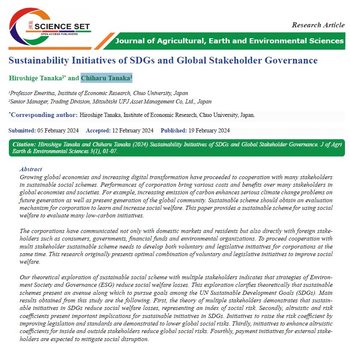Sustainability Initiatives of SDGs and Global Stakeholder Governance
Authors
Hiroshige Tanaka & Chiharu Tanaka
Chuo University & Mitsubishi UFJ Asset Management Co, Ltd.
Report Date
Feb. 1, 2024
Document summary
Growing global economies and increasing digital transformation have engaged many stakeholders in sustainable social schemes. The performance of corporations results in both costs and benefits to global economies and societies. For example, increasing carbon emissions causes problems for futures generation as well as present generations of the global community. Sustainability schemes should develop evaluation mechanisms so that corporations can assess and improve their impact on social welfare. This paper provides such a mechanism.
Theoretical exploration of sustainable social scheme with multiple stakeholders indicates that strategies of Environment Society and Governance (ESG) reduce social welfare losses. This exploration clarifies theoretically that sustainable schemes present an avenue along which to pursue goals among the UN Sustainable Development Goals (SDGs).
